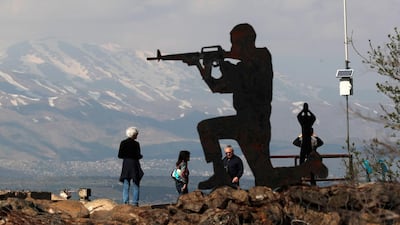Israel’s anti-missile defence system intercepted four rockets fired from neighbouring Syria early on Tuesday, the army said.
The Syrian Observatory for Human Rights said the rockets were fired from sites around the capital held by groups loyal to the Damascus government.
No harm was caused to Israeli communities in the occupied Golan Heights after warning sirens awoke residents early in the morning.
There was no immediate official comment from Syria but the Sana state news agency reported explosions were heard near Damascus International Airport, indicating an Israeli retaliatory strike.
“Four launches were identified from Syria towards Israeli territory, which were intercepted by the Israeli air defence systems,” the army said. “No hits on Israeli communities were identified.”
The Observatory reported "missile fire by Israeli aircraft on positions south and south-west of Damascus".
Syrian air defences opened fire in response, the war monitor said from Britain.
"The Israeli bombardment targeted positions held by pro-regime groups who launched the missiles against Israel," Observatory head Rami Abdulrahman said.
The Israeli military would not comment on the explosions in Syria, but Defence Minister Naftali Bennett was convening the top military officers in Tel Aviv to discuss the latest developments.
Foreign Minister Israel Katz was equally vague, telling Army Radio that "Israel will act in the way it sees fit".
The rare rocket fire comes a week after an Israeli air strike against a top Palestinian militant based in Syria.
Akram Al Ajouri, a member of the leadership of the militant Islamic Jihad group, who is living in exile, survived the attack but his son and granddaughter were killed.
About 450 rockets were fired into Israel last week from the Gaza Strip after a military operation against an Islamic Jihad commander by the Israeli army, but no rockets were fired from Syria.
The flare-up saw 34 Palestinians and no Israelis killed.
A ceasefire between Israel and militant groups was agreed to after 50 hours of clashes, but the deal remains precarious.
Israel frequently strikes Iranian interests in Syria but last week's air strike appeared to be a rare assassination attempt on a Palestinian militant in the Syrian capital.
Tension has been increased between Israel and Iranian proxies along its borders.
Israeli Prime Minister Benjamin Netanyahu has issued warnings recently about Iranian aggression throughout the Middle East.
Iran has forces based in Syria, Israel's northern neighbour, and supports Hezbollah militants in Lebanon. In Gaza, it supplies Islamic Jihad with money, weapons and expertise.
Mr Netanyahu also has claimed Iran is using Iraq and far-off Yemen, where Tehran supports Houthi rebels at war with a Saudi-led Coalition backing the government, to plan attacks against Israel.
Hamas also receives some support from Iran.

